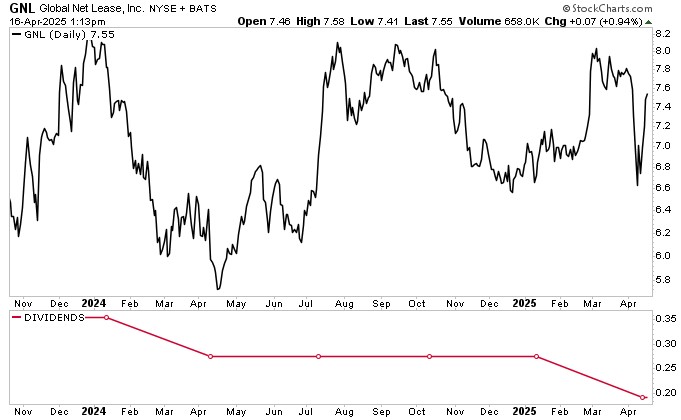10%-Yielding Global Net Lease Inc Crushing S&P 500

REIT Announces Transformative Sale
A number of recent events have helped juice the long-term prospects for Global Net Lease Inc (NYSE:GNL).
Real estate investment trusts (REITs) tend to do better when interest rates are lower. That’s because higher interest rates make it more expensive to borrow and cut into margins. Lower rates can also make it easier to service debt…and REITs generally carry a lot of debt.
On the other hand, higher rates result in lower profits and free cash flow (FCF); the latter is particularly important to us because that’s what’s used to pay for dividends.
The lower-interest-rate environment and recent events have made Global Net Lease a lot more compelling.
New-York-City-based Global Net Lease owns an international portfolio of over 1,200 properties, covering over 61 million square feet (the equivalent of 1,060 NFL fields) in 10 countries, including the U.S., France, the U.K., Italy, and Germany. (Source: “Fourth Quarter 2024 Investor Presentation,” Global Net Lease Inc, February 27, 2025.)
The top 10 tenants represent 21% of straight line-rent, with no single tenant accounting for more than 3.5%. Some of its top tenants include: FedEx Corporation (NYSE:FDX), Whirlpool Corporation (NYSE:WHR), U.S. General Services Administration (GSA), and McLaren
Some of Global Net Lease’s more interesting real estate portfolio metrics include:
- 97% of the properties are leased, with a remaining weighted-average lease term of 6.2 years
- 81% of the portfolio contains contractual rent increases based on annualized straight-line rent
- 61% of the portfolio’s annualized straight-line rent is derived from investment-grade and implied investment-grade-rated tenants
The problem with REITs is that some tenants can cancel their leases or choose not to renew them, or, if the company is doing badly, fail to pay entirely. This can also happen to REITs that are too diversified. But Global Net Lease has taken steps to avoid this.
A Transformative $1.8-Billion Sale
In February, Global Net Lease announced an agreement to sell its multi-tenant platform of 100 non-core properties to a subsidiary of RCG Ventures Holdings, LLC for approximately $1.8 billion. (Source: “Global Net Lease Announces Sale of Multi-Tenant Portfolio for Approximately $1.8 Billion,” Global Net Lease Inc, February 26, 2025.)
Once completed, this transaction will significantly reduce the REIT’s leverage, improve its liquidity position, and make it a pure-play, single-tenant net lease company. The transaction is also expected to result in $6.5 million in general and administrative expenses savings (G&A), and additional cash savings from a substantial reduction in annual capital expenditures.
Investors were pleased with what they heard, sending GNL stock up more than 13% to its highest trading level since October 2024.
Global Net Lease launched a disposition initiative in 2024, with the aim of reducing debt, enhancing financial flexibility, and lowering its cost of capital. Between the start of 2024 and the end of 2025, the REIT expects to have completed nearly $3.0 billion in sales.
Global Net Lease Dodges DOGE
Any REITs that have U.S. government tenants had to be somewhat fearful of what could happen should the Department of Government Efficiency (DOGE) decide to reduce space usage at one of their properties.
So far, DOGE has canceled 676 federal leases, slashing over $400.0 million in costs tied to office space. (Source: “Which Federal Offices Are Getting the Axe? Full Lease Termination List (Updated),” Propmodo, April 7, 2025.)
The list of offices being shuttered is always being added to. Earlier this year, Global Net Lease received notice from the General Services Administration (GSA) saying that it would be terminating its lease in Franklin, Tennessee. The GSA is one of the REIT’s biggest tenants.
However, on April 9, Global Net Lease announced that it had received written notice from the GSA saying that it would, in fact, remain at its Class A office building in Franklin, Tennessee, and that its existing lease agreement will remain in full effect. (Source: “Lease Agreement Between Global Net Lease and General Services Administration (GSA) Remains in Full Effect,” Global Net Lease Inc, April 9, 2025.)
Suffice it to say, investors were ecstatic, sending GNL shares up more than 13% over the following days. This helped erase most of the losses tied to the broad-based market sell-off in early April, after President Donald Trump announced his list of reciprocal tariffs on April 2, otherwise known as, “Liberation Day.”
Exceeds 2024 Earnings Guidance
For the fourth quarter ended December 31, 2024, Global Net Lease reported revenue of $199.1 million, down slightly from $206.7 million in the fourth quarter of 2023. The lower revenue was mostly a result of $835.0 million in dispositions that closed during the year. (Source: “CORRECTION – Global Net Lease Reports Fourth Quarter and Full Year 2024 Results,” Global Net Lease Inc, February 27, 2025.)
The REIT reported a net loss attributable to common stockholders of $17.5 million, which was a big improvement over the fourth-quarter 2023 net loss of $59.5 million.
Global Net Lease’s core funds from operations (FFO) improved to $68.5 million, or $0.30 per share, versus $48.3 million, or $0.21 per share, in the same prior-year period.
Adjusted funds from operations (AFFO) grew to $78.3 million, or $0.34 per share, compared to $71.7 million, or $0.31 per share, in the fourth quarter of 2023.
For 2024, Global Net Lease announced that revenue increased 56% on an annual basis to $805.0 million. Its 2024 net loss improved to $131.5 million, from $239.3 million in 2023.
Core FFO came in at $229.9 million, while full-year 2024 AFFO was $303.8 million, or $1.32 per share
During the year, Global Net Lease reduced its net debt by $734.0 million and portfolio occupancy increased from 93% to 97%. It also announced a $300.0-million share repurchase program.
Commenting on the results, Michael Weil, Global Net Lease’s chief executive officer, said, “We are incredibly proud of our achievements at GNL in 2024 and even more excited about what lies ahead. The sale of our multi-tenant portfolio would mark a pivotal moment, reinforcing the strong momentum we have built.”
GNL Stock Up 10.7% in 2025
As a REIT, Global Net Lease has to legally distribute at least 90% of its taxable income to shareholders in the form of a dividend. This means the dividend payout can fluctuate. Most recently, the company’s board declared a fourth-quarter dividend of $0.19 per share, or $0.76 per share on an annual basis, for a forward dividend yield of 10.16%.
That quarterly payout is down from the fourth quarter payout of $0.28 per share, a level it had held since April 2024. While a cut in dividends is not something I like to see, an improvement in Global Net Lease’s operations could allow for higher dividends.
Investors didn’t seem bothered by the lowered dividend. And a transformed version of Global Net Lease should see that payout level increase over the coming quarters.
This helps explain why GNL stock is having a pretty good year, up 10.7% in 2025 and 32% on an annual basis. That’s a far cry from the sad numbers the S&P 500 is sporting, down 9.5% in 2025 and up just 5.3% on an annual basis.

Chart courtesy of StockCharts.com
The Lowdown on Global Net Lease Inc
Global Net Lease is a great REIT with a strong international presence. Thanks to its 2024 strategic disposition initiative, it expects to have completed $3.0 billion in sales by the end of 2025.
This transaction will reshape GNL into a pure-play, single-tenant net lease company, eliminating operational complexities, general and administrative expenses, and capital expenditures tied to multi-tenant retail properties.
More importantly, it will accelerate the REIT’s deleveraging strategy and fortify its balance sheet. This should support higher dividend payouts and be beneficial to its share price.
And a higher share price and dividend payouts are what investors want to see, including the 418 institutions that hold 67.01% of all outstanding shares. The three biggest holders are BlackRock Inc, The Vanguard Group, and State Street Corporation. (Source: “Holders,” Yahoo! Finance, last accessed April 16, 2025.)











